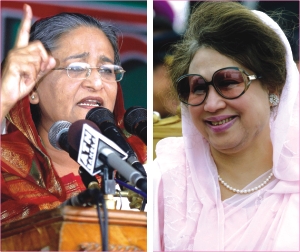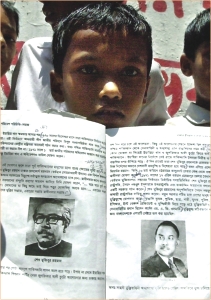
Inside
|
The election conundrum Mahfuz Anam examines the winner-take-all mentality in Bangladeshi politics that has made the stakes so high in the coming elections
Why has holding elections become so difficult? Simply put, because the cost of losing one has become too high, in fact unbearable. Today losing an election will inevitably mean being totally marginalized by the winners, persecuted, perhaps physically assaulted, sometimes driven out of the locality from where one contested, and if the rivalry is very intense, then the burning down of one's home. In some cases, one can even be killed. A predatory winner-take-all mentality has gripped the mind of our political leaders and parties. This winner-take-all mindset has now enlarged itself to encompass not only political power but also social, and especially, economic power. Thus today a defeated candidate is often isolated in the locality, humiliated on every possible occasion, and essentially ostracized. If one is in business, then losing an election may very well mean no contracts or business for the coming five years unless some underhand deal is made. If one is a professional then his or her firm is most unlikely to get any contract while in opposition. Conversely, winning an election has become far more than a matter of getting the majority of the constituents to vote for you. It is a magic wand that opens up all sorts of known and unknown doors that can and do drastically change one's life. Overnight one is able to possess unimaginable levels of wealth in terms of property, industry, and access to ready cash. Equally important, as a result of winning an election, one is able to distribute favour and exert influence that enhances power and authority within one's own community. Power is often seen in terms of being able to dish out favour, which, in an employment-scarce country like ours, means giving people jobs, which again generally means government jobs, regardless of whether they are needed or not. (That is one reason why government bureaucracies are so bloated in developing countries). Winning an election, for the individual candidate, has actually become an "investment." In fact it is perhaps the best there is. There is practically no risk, the rate of return is highest compared to any other investment around and it has the advantage of enormous diversification -- meaning there is really no limit to how many things one can own and how different the portfolios may be. The only risk is winning the election. Thus everything has to be brought to bear on winning it. Because if one loses, then the whole "investment" is lost. When gains are so enormous, then naturally the cost of the electioneering process has become very high. Today election expenses have risen to exorbitant levels far beyond the reach of ordinary contestants. This leaves an open field for only rich businessmen, black money holders, and other corrupt people to either contest elections or fund those who are running for public office, thus gaining enormous influence over the legislative process. Thus, black money has made inroads into our politics as never before. The very fact that our political parties have no official bank accounts which are audited and no transparency in how they receive donations, from whom and how much, makes politics ripe ground for the entry of black money. In fact, it is no secret that political parties depend heavily on illegal wealth to fill their coffers, without which they cannot raise the type of ready money they need for participating in elections. Thus, a dangerous nexus has already grown between black money and politics in our country that is eating away at the very entrails of political life. Along with black money, criminalization of politics is also another reason why holding elections has become so very difficult here. Criminal gangs line up behind one political party or another, behind one candidate or another, and become an integral part of the party or the person. This has become necessary again for the simple reason that the cost of losing the election has become akin to obliteration from the political and social scene. We have a large unemployed youth population. There is a significant percentage among them who are educated, at least to some extent. As we know, it is the educated unemployed youth who are the most likely to be frustrated and most vulnerable to take the law into their own hands -- meaning the most likely to join the ranks of criminals. The fact that a section of students belonging to student bodies of major political parties has now become entangled with the various crimes clearly indicates the growing links between youth, crime, and politics. Another manifestation of the tribal nature of our politics, which makes holding of elections so very difficult, is the family orientation of our two major parties, the hereditary nature of their leadership, and the intense and almost pathological nature of the hatred between them. Based on their hatred, a whole chain of secondary leadership has grown whose very survival and relevance depends on the continuation and further intensification of the two leaders' rivalry and hatred. In fact, one can perhaps hazard a reasonable guess that many senior and junior leaders from both sides would almost instantly fall by the wayside if, by some magic, these two leaders were to find a workable relationship of some sort. Both sides run their respective parties as if they held some proprietorial rights where family members and direct descendents of the founder claim a natural right to leadership, as if we were still in the feudal days. To be fair here, we have to admit that family orientation of parties and hereditary nature of party leadership appears to be a South Asian disease, by which India and Sri Lanka have been afflicted much earlier than ourselves. However, that should not be a justification to introduce it here, where there had been no such tradition before the advent of Sheikh Hasina and Khaleda Zia. Fear of losing elections reached a new height after the way Awami League candidates and activists were treated in areas where they lost after the 2001 elections. Physical assault, driving of people away from their homes, and burning of properties were frequent. The severest of the repression was carried out on Hindu minority populations who are generally suspected to be AL sympathizers. Thousands of opposition workers were physically harmed, with many suffering severe wounds, some of whom may have been maimed for years if not for life. The prospect of physical violence makes losing an election almost a life-threatening prospect. This adds to the motivation of winning an election by any means necessary.
During our democratic experiment from 1991 onwards, the abuse of political power for corruption has been on the rise. However, the extent to which this abuse reached in the last five years makes it clear why political power has become such a coveted goal and how only being in the government has become absolutely essential. Corruption has become such an integral part of politics that it may not be an exaggeration to state that people try to win elections not to serve the people but to exploit them. Politics, as it is practiced today, has become the easiest and most effective conduit for corruption. Public representatives, instead of being guardians of the public interest have become their most ruthless exploiters. Thus national elections in Bangladesh have literally taken the form of tribal warfare. As tribes clash to impose their overall supremacy in every field of a society's life, so also in Bangladesh political parties prepare for election in a do or die fashion, staking everything and bringing all sorts of forces into play in what should have normally been a festival of democratic expression. It is still our hope that it will ultimately turn out to be a festival of free exercise of public will. But as of now, holding free and fair and violence-free elections looks as though it is likely to be an extremely challenging task. Mahfuz Anam is Editor and Publisher, Forum Magazine. Bangladesh Dreams Shamsur Rahman Bangladesh dreams, a bronze statue, still and colossal, Bangladesh dreams, a wild deer Bangladesh dreams -- overwhelmed by desire Translation: Fakrul Alam |

 Of all the difficulties in holding a free and fair election today, the biggest is corruption. It is not only that candidates or their supporters are corrupt, it is that the whole system relating to political power is now one of patronage and rent seeking, which can only be possible when in power.
Of all the difficulties in holding a free and fair election today, the biggest is corruption. It is not only that candidates or their supporters are corrupt, it is that the whole system relating to political power is now one of patronage and rent seeking, which can only be possible when in power.